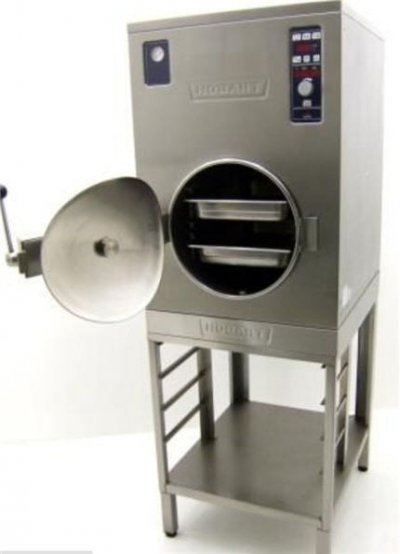Cooking Goddess
Chef Extraordinaire
Over the ages there have been many threads with many posts regarding many ways to hard-cook an egg.
http://www.discusscooking.com/forums/f22/how-do-you-boil-an-egg-26432.html
http://www.discusscooking.com/forums/f22/iso-hard-boiled-egg-basics-84378.html
http://www.discusscooking.com/forums/f22/differing-opinions-for-the-pefect-hard-boiled-egg-45814.html
http://www.discusscooking.com/forums/f22/how-to-make-the-perfect-boiled-egg-53851.html
And on, and on... In the movie "Bull Durham", Annie Savoy states "I've tried 'em all, I really have..." when she says her monologue equating religion to baseball. That's how I've felt about hard-cooking eggs. I've tried them all. I think I have finally found the true way.
About a month ago, Serious Eats put up an old article about hard-cooked eggs. I never tried it that way before, so I gave it a go. Cue the Monkees, 'cuz I'm a Believer!
Perfect Boiled Eggs
It's so simple. Bring a pot of water to a boil (I've used a 2-quart for two eggs with great results). When the water comes to a full boil, immerse your eggs into the boiling water (I use my spider) and boil for 30 seconds with the cover OFF the pot. After 30 seconds, cover pot and immediately reduce to a low simmer. Simmer for required length of time depending on desired doneness. (I have a glass-top stove, so I turn the burner off, slide the pot half-off the hot spot, then turn the heat back to low when it looks like "barely simmer" state has been reached.) 11-12 minutes gives me perfectly done hard cooked eggs. As soon as time is up, remove the eggs from the simmering water (again with the spider, I am) and put into a bowl of iced water. Results? Firm white, cooked yolk, no green ring, and very easy to peel - usually without any dimple in the wide end of the egg.
You do not need salt/vinegar/baking soda. You do not need to put a tiny whole in the large end of the shell. You don't need to crack the egg shells as you dump the eggs in the ice water. Easy Peasy, perfect eggs.
The eggs in the salads I made for tonight's dinner were 8-minute eggs. Just the barest of "done" where they meet the white, the rest of the yolk was soft but not liquidy. Kinda like a paste, but in a nicer way. Himself likes good, runny-yolk sunnyside up ones, and likes a looser yolk just about anywhere. I've just moved away from the "give me a rock-hard yolk, darn it!" stage. This is as soft as I can go. The beauty of cooking them this way gives you the option of taking one out with the spider and cooling it earlier than the second one. Just NOW thought of that!

Like the man said in the long-ago Alka-Seltzer commercial, "Try it, you'll like it".
* I hope I didn't go over quota with Pop Culture references...
http://www.discusscooking.com/forums/f22/how-do-you-boil-an-egg-26432.html
http://www.discusscooking.com/forums/f22/iso-hard-boiled-egg-basics-84378.html
http://www.discusscooking.com/forums/f22/differing-opinions-for-the-pefect-hard-boiled-egg-45814.html
http://www.discusscooking.com/forums/f22/how-to-make-the-perfect-boiled-egg-53851.html
And on, and on... In the movie "Bull Durham", Annie Savoy states "I've tried 'em all, I really have..." when she says her monologue equating religion to baseball. That's how I've felt about hard-cooking eggs. I've tried them all. I think I have finally found the true way.
About a month ago, Serious Eats put up an old article about hard-cooked eggs. I never tried it that way before, so I gave it a go. Cue the Monkees, 'cuz I'm a Believer!
Perfect Boiled Eggs
It's so simple. Bring a pot of water to a boil (I've used a 2-quart for two eggs with great results). When the water comes to a full boil, immerse your eggs into the boiling water (I use my spider) and boil for 30 seconds with the cover OFF the pot. After 30 seconds, cover pot and immediately reduce to a low simmer. Simmer for required length of time depending on desired doneness. (I have a glass-top stove, so I turn the burner off, slide the pot half-off the hot spot, then turn the heat back to low when it looks like "barely simmer" state has been reached.) 11-12 minutes gives me perfectly done hard cooked eggs. As soon as time is up, remove the eggs from the simmering water (again with the spider, I am) and put into a bowl of iced water. Results? Firm white, cooked yolk, no green ring, and very easy to peel - usually without any dimple in the wide end of the egg.
You do not need salt/vinegar/baking soda. You do not need to put a tiny whole in the large end of the shell. You don't need to crack the egg shells as you dump the eggs in the ice water. Easy Peasy, perfect eggs.
The eggs in the salads I made for tonight's dinner were 8-minute eggs. Just the barest of "done" where they meet the white, the rest of the yolk was soft but not liquidy. Kinda like a paste, but in a nicer way. Himself likes good, runny-yolk sunnyside up ones, and likes a looser yolk just about anywhere. I've just moved away from the "give me a rock-hard yolk, darn it!" stage. This is as soft as I can go. The beauty of cooking them this way gives you the option of taking one out with the spider and cooling it earlier than the second one. Just NOW thought of that!

Like the man said in the long-ago Alka-Seltzer commercial, "Try it, you'll like it".
* I hope I didn't go over quota with Pop Culture references...



 ) Perfect. Every. Time. Well, except the time I forgot to leave the lid off for the first 30 seconds. You want to know what happens? The eggs crack. Big time. They're still easy to peel, though!
) Perfect. Every. Time. Well, except the time I forgot to leave the lid off for the first 30 seconds. You want to know what happens? The eggs crack. Big time. They're still easy to peel, though! 